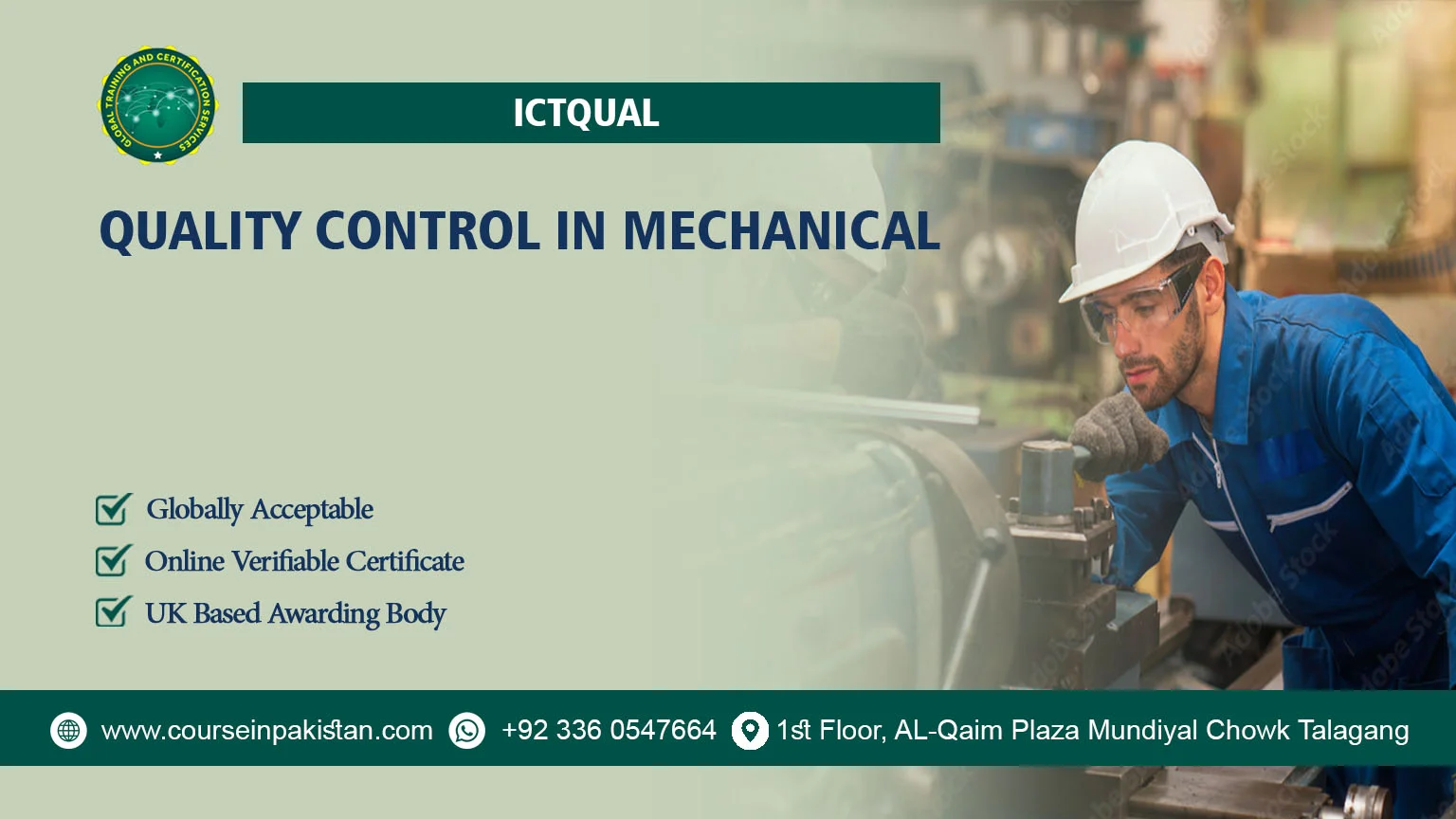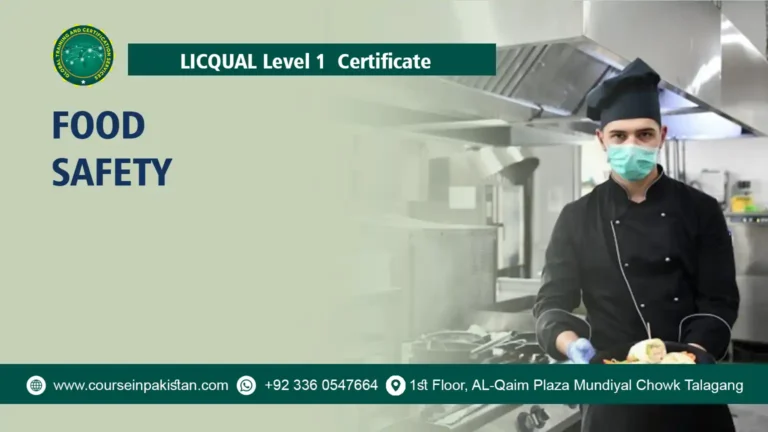
ICTQual Quality Control in Mechanical
Quality control in mechanical engineering is crucial for ensuring the reliability, safety, and efficiency of mechanical systems and components. From manufacturing processes to assembly and maintenance, meticulous oversight is essential to meet standards and regulatory requirements. The course on Quality Control in Mechanical provides comprehensive training for professionals aiming to excel in maintaining high-quality standards in mechanical engineering.
Course Introduction
The Quality Control in Mechanical course focuses on the principles, methods, and practices essential for maintaining and improving quality standards in mechanical engineering. Participants learn how to implement quality control processes to minimize defects, optimize performance, and ensure compliance with industry standards.
Course Overview
Participants in this course will delve into essential aspects of quality control specific to mechanical engineering:
- Fundamentals of Quality Control: Introduction to quality management principles and their application in mechanical systems.
- Testing and Inspection Techniques: Methods for testing, inspecting, and evaluating mechanical components and assemblies.
- Quality Assurance Processes: Implementing processes to prevent defects and ensure consistent quality in manufacturing and assembly.
- Regulatory Compliance: Understanding and complying with relevant regulations and standards in mechanical engineering.
Course Benefits
- Enhanced Product Quality: Ensure mechanical products and components meet design specifications and regulatory requirements.
- Cost Efficiency: Reduce waste and rework through effective quality control measures.
- Career Advancement: Gain specialized skills that enhance career prospects in mechanical engineering and manufacturing industries.
- Risk Mitigation: Identify and mitigate risks related to product defects and non-compliance.
Course Study Units
The Quality Control in Mechanical course typically covers study units such as:
Learning Outcomes
Fundamentals of Quality Control
- Learning Outcomes:
- Understand the principles and importance of quality control in various industries.
- Identify key elements of a quality control system and their roles in ensuring product or service quality.
- Apply fundamental quality control techniques to improve processes and outcomes.
Statistical Methods for Quality Control
- Learning Outcomes:
- Apply statistical tools and methods to analyze and monitor quality control data.
- Interpret statistical process control charts and graphs to assess process stability and capability.
- Implement statistical sampling techniques to ensure representative data for quality control purposes.
Metrology and Measurement Systems
- Learning Outcomes:
- Understand the principles of metrology and measurement uncertainty.
- Evaluate measurement systems and instruments to ensure accuracy and reliability.
- Apply metrological principles to establish traceability and calibration of measurement equipment.
Quality Inspection and Testing
- Learning Outcomes:
- Develop and implement inspection plans and procedures for quality assurance.
- Conduct quality inspections using appropriate techniques and instruments.
- Interpret test results and make informed decisions based on inspection outcomes.
Quality Management Systems (QMS)
- Learning Outcomes:
- Understand the structure and requirements of Quality Management Systems (QMS) standards such as ISO 9001.
- Implement and maintain a QMS to improve organizational processes and customer satisfaction.
- Conduct internal audits to assess QMS effectiveness and compliance.
Reliability Engineering
- Learning Outcomes:
- Apply reliability engineering principles to predict and improve product or process reliability.
- Identify factors affecting reliability and implement strategies to enhance system performance.
- Conduct reliability testing and analysis to optimize maintenance and lifecycle management.
Design of Experiments (DOE)
- Learning Outcomes:
- Design and execute experiments to optimize product or process design.
- Analyze experimental data using statistical methods to identify significant factors and interactions.
- Apply DOE principles to improve quality, reduce variability, and enhance performance.
Root Cause Analysis and Corrective Action
- Learning Outcomes:
- Implement root cause analysis (RCA) techniques to identify underlying causes of quality issues.
- Develop effective corrective and preventive actions (CAPA) to address root causes and prevent recurrence.
- Use RCA tools such as fishbone diagrams and 5 Whys to facilitate problem-solving and continuous improvement.
Advanced Quality Control Techniques
- Learning Outcomes:
- Explore advanced quality control methods such as Six Sigma, Lean, and Total Quality Management (TQM).
- Apply advanced statistical techniques (e.g., regression analysis, hypothesis testing) to improve quality processes.
- Implement advanced quality tools (e.g., Pareto analysis, failure mode and effects analysis) for problem-solving and process improvement.
Quality Control in Supply Chain Management
- Learning Outcomes:
- Evaluate and manage quality risks within the supply chain to ensure product or service quality.
- Develop supplier quality agreements and performance metrics to maintain standards.
- Implement strategies for continuous improvement and collaboration across the supply chain.
Quality Control in Product Development
- Learning Outcomes:
- Integrate quality control principles into the product development lifecycle.
- Ensure product designs meet quality requirements and customer expectations.
- Collaborate with cross-functional teams to address quality considerations from concept to launch.
These learning outcomes equip professionals with the knowledge and skills necessary to implement effective quality control strategies across various industries, ensuring product and service excellence, customer satisfaction, and continuous improvement.
Who Is This Course For?
The Quality Control in Mechanical course is suitable for:
- Mechanical Engineers and Technicians: Involved in designing, manufacturing, and maintaining mechanical systems.
- Quality Assurance/Control Professionals: Responsible for ensuring quality standards and compliance in mechanical engineering.
- Manufacturing Managers and Supervisors: Overseeing production processes and quality management.
- Students and Graduates: Pursuing careers in mechanical engineering or related fields.
Future Progression for This Course
Graduates of the Quality Control in Mechanical course can progress in various ways, including:
- Advanced Certifications: Pursue certifications in specialized areas of mechanical quality management or process improvement.
- Advanced Training: Attend workshops or courses focusing on advanced inspection techniques or quality management systems.
- Project Management: Transition into roles involving project management or supervision of mechanical production.
- Consulting: Provide expertise as a consultant in mechanical quality assurance/control for industries such as automotive, aerospace, or manufacturing.
The Quality Control in Mechanical course equips professionals with essential skills and knowledge to ensure that mechanical systems and components meet rigorous quality standards and compliance requirements. By mastering the principles of quality control and implementing effective testing and inspection techniques, participants contribute to the safety, reliability, and efficiency of mechanical engineering projects. Embrace the opportunity to advance your career and play a pivotal role in maintaining excellence in mechanical systems with the Quality Control in Mechanical course.






